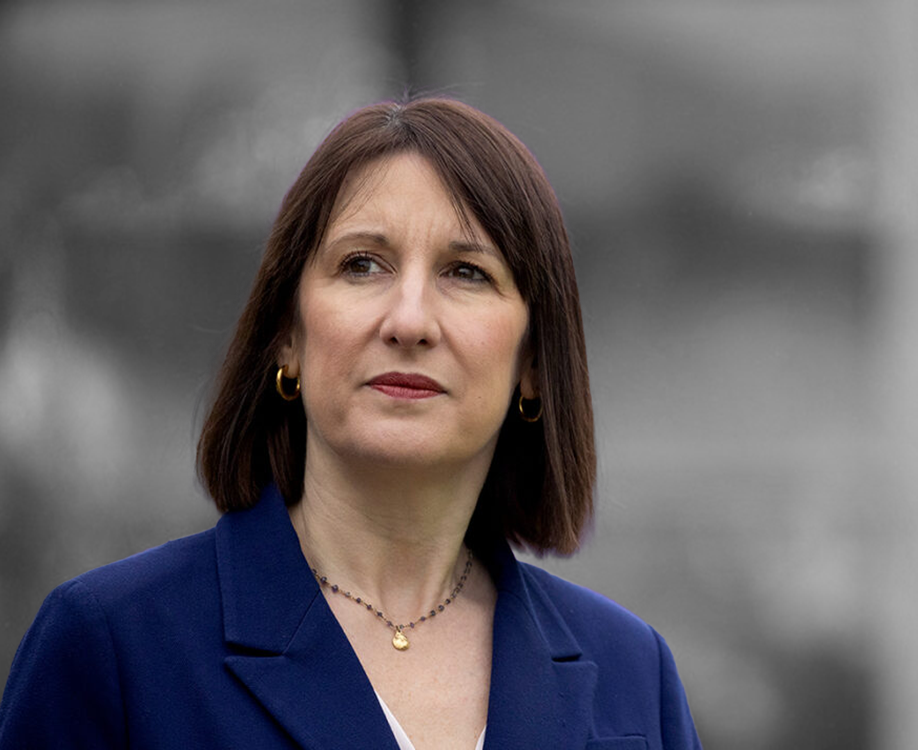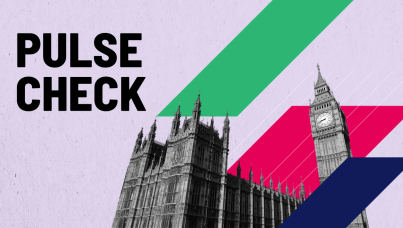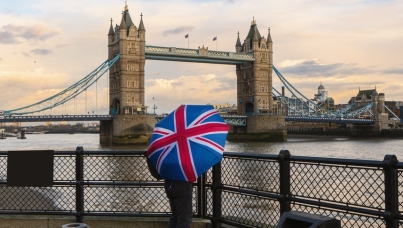Public opinion, public finances, and politics – the pressures shaping the Autumn Budget
Access the presentation slides here.
With the Autumn Budget just a week away, Ipsos’ latest Beyond the Bubble webinar, ‘The Autumn Budget Briefing’, brought together leading voices from Ipsos, The Institute for Fiscal Studies, and The Spectator, to unpack the public mood, the fiscal realities, and the political pressures shaping the Chancellor’s announcement.
The webinar, chaired by Trinh Tu, Managing Director of Ipsos in the UK’s Public Affairs team, painted a detailed picture of the potential societal, economic and political implications of the Chancellor’s upcoming announcement.
Trinh started the webinar by setting the scene:
I think it’s an understatement that this has been the most turbulent run up to a budget in recent memory. It’s happening much later than usual and that has created fertile grounds for lots of speculation and lots of uncertainties...
A Gloomy Public Mood
Gideon Skinner, Senior Director of UK Politics at Ipsos, opened with a stark picture: public pessimism about the economy has worsened, with 3 in 4 Britons expecting things to deteriorate and one in three finding it difficult to get by.
And people are increasingly placing blame for this on Labour. Earlier in the year, responsibility was shared between Labour, Covid, Brexit, the previous Conservative government and global crises. Now, the focus is landing more directly on Labour.
Businesses are also struggling. SMEs report that growth has flatlined, and political stability has become a top concern, reflecting the impact of recent policy uncertainty.
What does this mean for the Budget?
- 6 in 10 say they feel anxious about how the Budget will affect their finances – even more than were worried ahead of the Spring Statement earlier this year.
- Ipsos social media tracking identifies diverse groups who have been expressing worries about the cost of living, pensions and business costs.
When it comes to what the public want to see from the Budget, the public remains split:
- 30% want higher spending, even if taxes rise, while 36% want lower personal taxes (and we are seeing signs of thermostatic public opinion, with the mood turning slightly away from more spending and more borrowing since before the election, and more in favour of tax cuts)
- And when forced to choose tax increases, people overwhelmingly prefer rises that affect other groups - especially wealth taxes, the highest income tax rates, and duties on tobacco and alcohol.
None of the ‘big’ tax rises are favoured by the public. When asked to choose only between a rise in income tax, VAT, NICs or freezing personal tax thresholds, freezing thresholds gets the most support at 18%, but just as many are against the idea, and even more say something else or none of the above. And despite the practical economic difficulties of a “smorgasbord” tax raising approach, the public still prefer raising many different taxes on a number of individual groups (even when that includes pensioners, GPs and motorists as well as high earners) over a single tax that everyone has to pay such as income tax or VAT – although again only by 39% to 21%.
Yet Britons do have broad priorities that they want to see delivered in the Budget:
- Higher earners taxed and no increases for low and middle-income earners
- Reduction in the cost of living by things like lower prices for essentials and utility bills
- Increased spending on public services, especially the NHS, education, infrastructure and housing
- Improved social support for vulnerable groups, especially for pensioners, disabled people and low-income families, but combining this with welfare reform to incentivise employment
- Economic stability and growth, balanced budgets, and a move away from sudden tax rises or spending cuts
The challenge for Labour is that these expectations sit alongside its own falling political fortunes. Gideon explained how Ipsos’ latest polling has Reeves on the lowest satisfaction ratings ever recorded by Ipsos for a Chancellor, Labour have lost their lead on best policies on the economy, and their vote share has dropped to 18% - their equal lowest vote share ever recorded by Ipsos, with records going back to 1977. At the same time it is also true that most people think taxes would go up, and spending on public services down, under Reform and the Conservatives too – there is a “none of the above” public mood at the moment.
Gideon concluded:
Labour clearly haven’t been able to turn around this prevailing and entrenched sense of public pessimism, and with this current public mood, it’s going to be difficult to persuade the public over tax rises. Labour needs to present a more positive vision for the future if the next 6 months after the Autumn Budget are not to be as challenging as the 6 months we’ve just seen since the Spring Statement.
A Fiscal Tightrope
![]()
Ben Zaranko, Associate Director at the Institute for Fiscal studies was up next, outlining the difficult fiscal environment facing the Chancellor.
The combination of stagnant GDP per capita and increased debt interest payments have resulted in big debt stock, equivalent to about £60 billion extra a year to government costs. Against this depressing backdrop, Reeves is also battling with minimal headroom and an expected productivity downgrade, which makes sticking to her fiscal rules tricky.
Alignment to the rules is made even more difficult by the government’s reversal of several policies on social security since the Spring and failure to reduce welfare spending, combined with pressures to increase spending in areas like child benefits, disability benefits and defence. All this suggests that tax rises are a likely route in the Budget, despite Labour’s manifesto commitments to not raise any of the major taxes.
Ben explained how meeting the fiscal rules requires a fiscal consolidation, leaving Rachel Reeves with 2 big choices:
1 - Should it come from spending cuts, tax rises or both?
- Spending cuts are possible, but must be deliverable and credible against a backdrop of limited appetite for welfare cuts, the fact that budgets were agreed just recently in the Spending Review, and the struggles facing many public services.
- Tax rises could raise money with a ‘smorgasbord’ approach if she avoids the big taxes, but this has its drawbacks – uncertainty, damaging economic side-effects, angry interest groups, and less favourable reactions from the bond markets.
- The timing of the measures could also be significant – if difficult decisions are delayed, they may not be believed.
- Instead, Ben highlighted that the Chancellor is widely expected to extend the cash freeze in personal tax thresholds, but this is still something that people will feel.
2 - Should she go for a larger consolidation to build more ‘headroom’?
- Reeves has £10 billion of headroom, similar to Jeremy Hunt but much less than previous Chancellors.
- Being so close to the rules is one reason why little changes in the forecast causes toxic speculation cycles.
Ben left us with 4 things to look out for:
- Reform: as well as raising taxes, is the Chancellor taking steps towards a better tax system?
- Credibility: is the package deliverable? Is it viewed that way by financial markets?
- Wider economic impacts: what will the Budget mean for growth, inflation and the labour market?
- Policy volatility: will the Budget help to break out of this damaging cycle of speculation and uncertainty?
Ben summed up with a call for more strategic policymaking:
Can we move to a world where we can have a more sensible, longer term debate about tax and spending and about where we want the country to go, who should be paying what in return for what and get away from… the relentless speculation of what may or may not be in the Budget.
Political Pressures Mount
Lucy Dunn, Political Correspondent at The Spector, turned to the political landscape, which is proving just as challenging for Labour as the economic one.
Labour’s 411-seat, 174 supermajority may look like a blessing, but Lucy explained it comes with problems. A group so large is harder to manage, and vocal dissent is growing, particularly after policy reversals on this like welfare and winter fuel payments. Scepticism is not just on the left of the party, but also growing among previous Starmer supporters.
Labour was elected promising a manifesto of change, that country would be put first, and would prioritise working people. But the cracks started to show quickly - such as rows over cronyism and freebies, public unrest - and Labour’s promise of grown-up politics and serious governance hasn’t quite matched up with the reality experienced by voters. The government appears to be shying away from taking the tough decisions needed to deliver that change and becoming more short-term in its outlook rather than looking to the long-term, which will also be frustrating business.
Starmer’s policy U-turns, and low satisfaction scores, has led to growing frustration amongst MPs and dented support, particularly amongst backbenchers. These discontented groups are also growing in confidence, that they can pressure the government to change track and succeed - as seen with the welfare bill earlier this year, and the current debate over the two-child benefit cap. At the same time, the Opposition are also now criticising Labour for the cost of some of these decisions, and linking them to the need for tax rises.
The Chancellor is faced by numerous tough choices ahead of the Budget, but while some of these are related to her inheritance from the previous Conservative government, Labour needs to accept some responsibility too. Further policy U-turns, e.g. the income tax announcement, have been poorly communicated, spooking the markets and opening Labour up to even more criticism.
Labour also faces serious electoral tests in Wales, Scotland and local council elections. Poor results could heighten speculation about leadership changes or force further strategic shifts, but questions will be raised even before that if the Budget fails to impress.
Lucy explained that these impending elections are closing in on Labour MPs, reminding them of what little time they have left to enact the change they promised, and stated that
…there is an increasing view… amongst people who are actually in government themselves that Starmer is simply not up to the job.
And with the Conservatives and Reform holding press conferences this week, outlining their fiscal strategies, it’s clear they are aiming to position themselves as stronger on economic management than Labour (despite questions about their own inconsistencies), and are offering voters contrasting options to Labour’s approach.
Audience Q&A
With the core presentations concluded, Trinh Tu returned to the virtual stage to chair the audience Q&A.
Watch the webinar to hear our expert panellists’ answers and the full presentations.
Looking ahead
It’s clear from the discussion that next week’s Budget is about much more than the numbers. It needs to speak to the anxieties of the public and businesses who are wrestling with rising costs, it must satisfy jittery markets, whilst also calming internal party tensions.
But above all, it needs to give voters a clear sense of direction over what the government stands for.
Whilst our speakers made it clear that there are no easy answers, whatever is announced next week will need to do more than balance the books. It will need to convince people that stability and progress are possible again.









